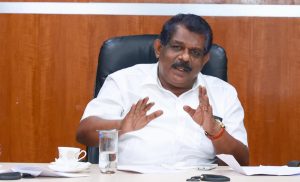LDF spared embarrassment as the court will now deal with Raju's petition seeking to have the case quashed only after a month.

The Kerala High Court order came on a petition by Dr KK Vijayan. (Supplied)
In a reprieve to the ruling LDF), the Kerala High Court on Wednesday, 3 August, stayed for a month all proceedings against Transport Minister Antony Raju in an evidence-tampering case.
The order came on a petition by Raju that sought the quashing of the case as it was without merit.
The high court order means the case against Raju, which was listed for hearing on Thursday in a court in Nedumangad near Thiruvananthapuram, will now be heard only after the high court deals with the minister’s petition. The high court hearing is set for next month.
The order also means the LDF, at least for the time being, has been spared the embarrassment of having one of its ministers face trial for evidence-tampering.
The campaign to pressure Raju to resign would also likely lose steam.

Kerala Transport Minister Antony Raju, who is accused of tampering with evidences in a narcotics smuggling case. (South First)
In court, Raju’s counsel argued that an evidence-tampering case could only be filed by the concerned court or an authorised officer as the alleged tampering occurred as regards to material evidence in the court’s custody.
The police, he said, had no right to file such a case .
Admitting the plea, Justice Ziyad Rahman AA observed that the minister “made a prima facie case in his favour”.
“It is seen from the record that the aforesaid proceedings have not been complied with in this case, and therefore I find a prima facie case in favour of the petitioner. Therefore, it is ordered that there shall be an interim order staying all further proceedings in CC 11/2014 on the file of the Judicial First Class Magistrate Court, Nedumbangad, for one month,” the judge said in his order.
In the case pending in the Nedumangad court, Raju faced the charge of tampering with evidence while practising as a lawyer in the early 1990s.
The origin of the case can be traced to April 4, 1990, when an Australian citizen, Andrew Salvatore, was booked under the Narcotic Drugs and Psychotropic Substances Act after he was arrested at Thiruvananthapuram airport with hashish concealed in his underwear. His lawyer was Antony Raju, then practising in the Thiruvananthapuram District Court.
In what seemed like an open and shut case, the trial court on 2 August, 1990, found Salvatore guilty and sentenced him to 10 years in jail. The evidence submitted in court included the underwear in which he was alleged to have smuggled the hashish.
When he appealed the verdict in the Kerala High Court, Salvatore urged the court to revisit the material evidence submitted in the lower court, especially the underwear. When the underwear was examined, it turned out to be too tiny to have been worn by Salvatore.
On that basis, the court acquitted Salvatore in February 1991 and he left India by the first week of March.
Five years later, in 1996, Salvatore was arrested for murder in Australia. In custody, he boasted that he had once escaped a jail term in India by paying a court clerk and a lawyer to tamper with the evidence. This information was passed on to Interpol and eventually reached Kerala Police.
The police launched an investigation and filed a case in 2006 that charged Raju and a court official, KV Jose, of switching the underwear to help Salvatore.
The case has been pending in the trial court for 16 years.
On a public interest litigation filed by rights activist George Vattukulam seeking an explanation for the delay, the high court had last week sought a status report from the Judicial First Class Magistrate Court, Nedumangad.
Meanwhile, the lower court set 4 August as the date to commence hearing in the case and, sources had told South First, that it intended to fast-track the case.
The setting of the date prompted Raju’s petition in the high court.

Apr 16, 2024

Apr 16, 2024

Apr 16, 2024

Apr 16, 2024

Apr 16, 2024